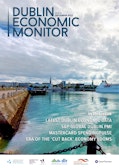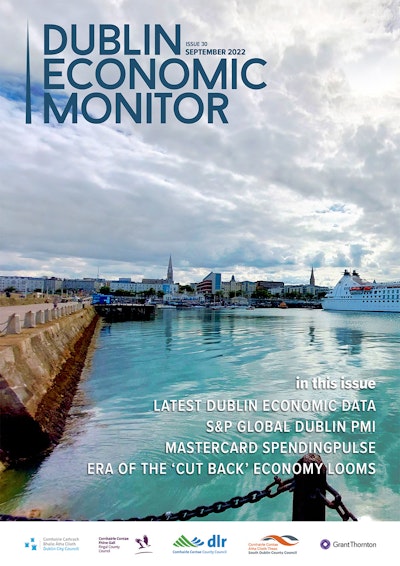The latest Dublin Economic Monitor (DEM), published this morning by the four Dublin Local Authorities, shows that although the Capital’s economic indicators remain in positive territory, the macro- environment is posing significant challenges.
Inflation is a prominent issue yet, according to data from MasterCard, retail spending in Dublin expanded by 1.6% QoQ and 7.4 YoY in Q2 2022. The greatest QoQ expansion was in Entertainment expenditure (+9.2%), followed by spending in department and clothing stores (Discretionary, +3%). This was in spite of the ongoing cost of living challenges facing the economy where energy prices, in particular, have impinged upon disposable incomes and are likely to intensify as winter approaches.
Inflation-related issues were also flagged in the latest Dublin S&P Global Purchasing Managers’ Index (PMI). Signs of a slowdown were evident as inflationary pressures weighed down on demand. The rate of expansion was solid in Q2 with a PMI reading of 56.0 (where greater than 50 signifies growth) yet this had eased from Q1 to the weakest rate since the recovery in output started in mid-2021. Growth of services activity remained strong though sharp and concerning slowdowns were seen in the manufacturing and construction sectors.
In positive news for the Dublin labour market, the unemployment rate dropped by 1.3 percentage points QoQ to stand at 4.5% (SA) in Q2. This was in line with pre-pandemic levels and highlights the strong demand for staff in the Capital. The latest data from job listings website, Indeed, reflects this, showing that Dublin job vacancies in August remained 41.2% above the February 2020 baseline.
In the residential sector, Dublin house completions reached a new post- Celtic Tiger peak of over 2,900 (SA) in Q2. Despite this new supply coming on stream, residential property price growth in the Capital accelerated to 11.7% YoY in June 2022, thus deepening affordability issues for prospective buyers.
The Dublin hotel market recorded a mixed summer period where occupancy rates peaked at 86.1% in May, yet declined to 71.1% in July. This concerning development may be related to Average Daily Rates for rooms which reached a new peak of €170 (SA) in June and may be acting as a deterrent for increasingly price-conscious tourists.
“Although the indicators for Dublin’s economy remain in positive territory, threats and challenges are mounting. The ongoing war in Ukraine, combined with inflation pressures, labour shortages, and lingering supply chain issues have created economic pressure points which will linger in to the winter period and beyond.”
ANDREW WEBB, CHIEF ECONOMIST AT GRANT THORNTON
The Dublin Economic Monitor is produced by Grant Thornton on behalf of the four Dublin Local Authorities to provide timely, reliable data and commentary on the economic landscape of the Dublin region. It covers 18 key indicators, consumer spending data from the MasterCard SpendingPulse™ and provides regular insights into different aspects of Dublin’s economy.


